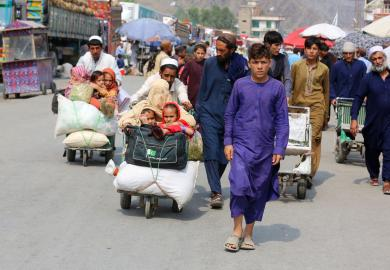RASC News Agency: The forced return of Afghanistani refugees from neighboring countries has intensified, with Taliban-controlled institutions claiming that more than 2,700 families were expelled from Iran and Pakistan in a single day and pushed into an Afghanistan already reeling from cascading crises. According to Taliban-run state media, the group’s so-called Commission for Refugees reported that 1,700 families crossed through the Torkham border, 156 through Spin Boldak, and 11 via Bahramcha after being expelled from Pakistan. Meanwhile, Iran deported 710 families through the Islam Qala crossing and 151 via the Pul-e Abrisham route. The United Nations estimates that nearly 2.3 million Afghanistani migrants have been forcibly returned from both countries so far this year a staggering figure that underscores the scale of displacement and the region’s deepening instability.
Humanitarian organizations warn that the mass expulsions are fueling what is already one of the world’s worst humanitarian crises. Afghanistan remains crippled by drought, recurrent floods, recent earthquakes, and economic paralysis, all exacerbated under Taliban rule. Aid workers caution that the sudden influx of returnees most of whom arrive destitute, jobless, and traumatized places unbearable strain on a fragile country already incapable of meeting its citizens’ basic needs. Relief agencies stress that the deportations, carried out in disregard of international human rights standards, compound the suffering of families who now face food insecurity, lack of shelter, and exposure to disease. These expulsions, they argue, are not merely border-control measures but acts that risk pushing Afghanistan into an even deeper humanitarian abyss.
Taliban officials have sought to project an image of control, claiming that deported families are sent to “temporary relocation centers” where they receive registration and initial aid. Yet human rights activists and civil society leaders dismiss these assurances as largely performative. The Taliban, they note, lacks the infrastructure, financial capacity, and political legitimacy to support such vast numbers of returnees. In reality, many families are abandoned in overcrowded provinces, left to survive in makeshift shelters or open terrain, without consistent access to food, healthcare, or education. For women and children, the situation is particularly dire, as Taliban policies have systematically dismantled social services and erased women from public life, leaving vulnerable families without even the most basic protections.
“The Taliban boasts of arrangements, but what they provide is nothing more than a facade,” said one Kabul-based activist interviewed by media. “Families are being discarded into an economy that does not exist. What awaits them is poverty, hunger, and despair while the Taliban uses their suffering for propaganda.” The international community has voiced growing alarm. United Nations agencies and humanitarian groups have repeatedly urged Iran and Pakistan to halt forced deportations, calling on both governments to recognize Afghanistan’s fragile humanitarian situation. However, both states have pressed ahead with expulsions, citing domestic economic strains and security concerns.
Analysts argue that the crisis exposes not only the indifference of regional powers but also the Taliban’s catastrophic inability to govern. Two years into their rule, the group has failed to create jobs, sustain basic services, or provide even minimal dignity to its people. Instead, it has prioritized authoritarian control, censorship, and ideological repression, while millions of Afghanistani citizens endure poverty and exile. The mass deportations are not a temporary challenge but a mounting humanitarian time bomb. Without a functioning economy, inclusive governance, or respect for human rights, Afghanistan is unable to reintegrate returnees. Every deported family becomes a new case of desperation, swelling the ranks of those dependent on dwindling humanitarian aid.
What is unfolding is not simply a refugee crisis at the borders, but the slow erosion of an entire nation’s social fabric. As long as the Taliban remains entrenched in power presiding over decline rather than progress returning families will not find safety or dignity, but rather a homeland stripped of hope, opportunity, and justice.






